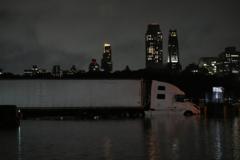Facing a public health emergency, Manila's newly reinstated mayor confronts mountains of garbage, representing a larger financial crisis within the city's waste management operations.
Manila's Mayor Declares State of Emergency Amid Trash Crisis

Manila's Mayor Declares State of Emergency Amid Trash Crisis
Manila's Mayor Francisco Domagoso returns to face a garbage collection crisis, with uncollected waste due to unpaid bills from contractors.
In an unexpected turn of events, Manila’s mayor, Francisco Domagoso, found himself tackling an escalating waste management crisis upon his return to office on Monday. The garbage collection services that predominantly service the Philippine capital ceased operations that very day, citing unpaid dues as the primary reason.
The situation had been deteriorating for weeks prior as overflowing refuse began to dominate notable areas of the city. Roads became choked with trash, rendering some impassable for vehicles. Commercial districts and major avenues near City Hall and the Supreme Court were particularly affected, with monsoon rains causing litter and waste bags to float through the streets.
Over two million residents were adversely impacted by the unsightly and overpowering odors of decomposing waste sweltering in the humid climate, with Domagoso reflecting on the environmental and health repercussions while livestreaming his responses. “It hurts the eyes, it hurts the nose, and it hurts public health,” he stated, urging the citizenry to store garbage indoors until reliable collection resumed.
In response to the urgent crisis, Domagoso declared a state of emergency for the city the following day. With a personal history as a former garbage collector prior to his acting and political career, he is acutely aware of the ramifications of the ongoing trash problem.
During an address to the City Council on Tuesday, Domagoso shifted the blame to the previous administration led by Mayor Honey Lacuna, accusing it of accruing debts that hindered waste management operations. As the city grapples with a growing public health threat, the path to restoring effective garbage collection remains fraught with multiple challenges, as officials work to secure the necessary funds to resume regular services.
The situation had been deteriorating for weeks prior as overflowing refuse began to dominate notable areas of the city. Roads became choked with trash, rendering some impassable for vehicles. Commercial districts and major avenues near City Hall and the Supreme Court were particularly affected, with monsoon rains causing litter and waste bags to float through the streets.
Over two million residents were adversely impacted by the unsightly and overpowering odors of decomposing waste sweltering in the humid climate, with Domagoso reflecting on the environmental and health repercussions while livestreaming his responses. “It hurts the eyes, it hurts the nose, and it hurts public health,” he stated, urging the citizenry to store garbage indoors until reliable collection resumed.
In response to the urgent crisis, Domagoso declared a state of emergency for the city the following day. With a personal history as a former garbage collector prior to his acting and political career, he is acutely aware of the ramifications of the ongoing trash problem.
During an address to the City Council on Tuesday, Domagoso shifted the blame to the previous administration led by Mayor Honey Lacuna, accusing it of accruing debts that hindered waste management operations. As the city grapples with a growing public health threat, the path to restoring effective garbage collection remains fraught with multiple challenges, as officials work to secure the necessary funds to resume regular services.




















